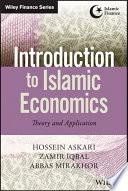
Introduction to Islamic Economics
Theory and Application
Gain deeper insight into the principles and theory of Islamic economics Introduction to Islamic Economics: Theory and Application provides an overview of the organizing principles and fundamentals of an Islamic economy. With deep discussion of the characteristics, rationale, key institutions, objectives, and instruments at work, the book addresses the core economic principles underlying a system based on the foundational teachings of Islam, and examines the implications for economic policies. Social welfare, economic justice, market functionality, efficiency, and equity are explored from an Islamic perspective, and the role and instruments of fiscal and monetary policy in Islamic systems are used to illustrate contemporary applications. Universities around the globe are offering courses on Islamic economics and finance, but despite the industry's rapid growth, most research has been focused on the financial principles rather than underlying economic principles. The first book of its kind, Introduction to Islamic Economics brings all the key concepts together into one reference volume. By outlining the ways in which Islamic finance and Islamic economics interrelate, this book can help readers to: Develop an understanding of the Islamic economic system and its institutional scaffolding Differentiate between the major characteristics of the dominant conventional economy and one based on the fundamental sources of Islam Understand the conditions that must be met for a just, well-balanced, stable, and growing economy Clarify the role of State, public policy, and risk-sharing in the Islamic financial system The Islamic financial system is expanding quickly, and those looking to increase their relevance in a changing economic landscape must get up to speed. Introduction to Islamic Economics provides a comprehensive overview of underlying economic system offering a deeper understanding of the feature of the system. This book is an excellent complement to Introduction to Islamic Finance, 2E by Iqbal and Mirakhor.
- ISBN 13 : 1118732987
- ISBN 10 : 9781118732984
- Judul : Introduction to Islamic Economics
- Sub Judul : Theory and Application
- Pengarang : Hossein Askari, Zamir Iqbal, Abbas Mirakhor,
- Kategori : Business & Economics
- Penerbit : John Wiley & Sons
- Bahasa : en
- Tahun : 2014
- Halaman : 416
- Google Book : http://books.google.co.id/books?id=Xl64BQAAQBAJ&dq=intitle:Basic+Concepts+of+Islamic+Market+Mechanisms&hl=&source=gbs_api
-
Ketersediaan :
This book is an excellent complement to Introduction to Islamic Finance, 2E by Iqbal and Mirakhor.









